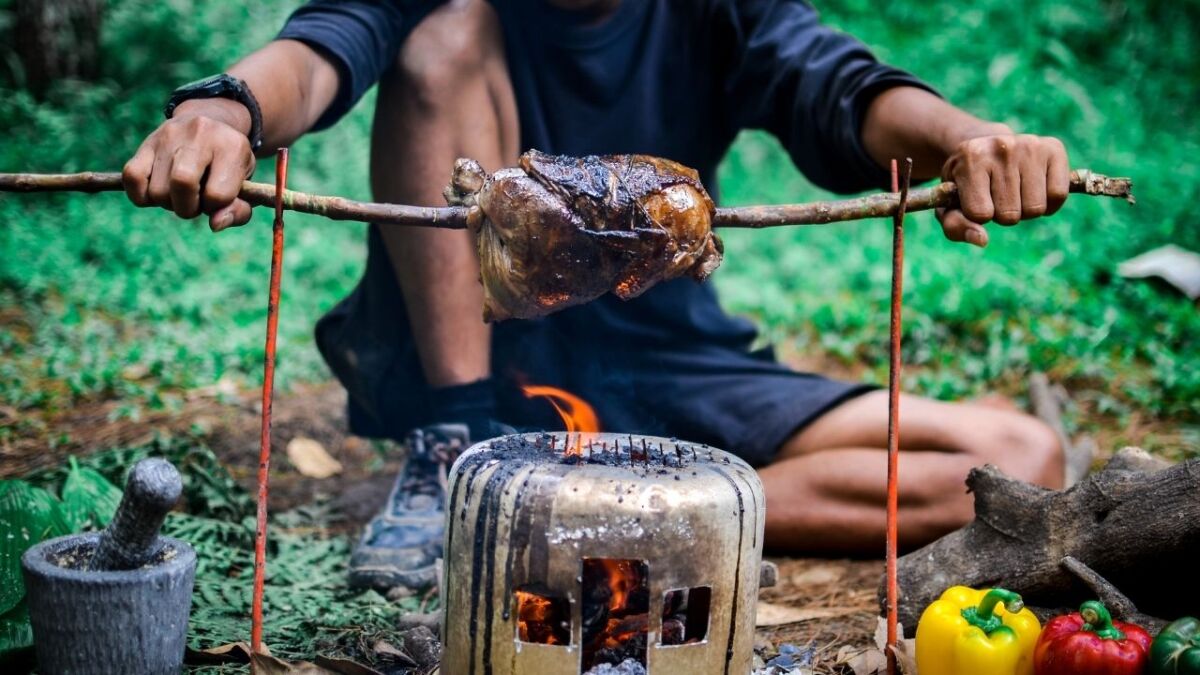
Improvisation
Nomen
Meaning
Improvisation is a crucial skill in the world of survival, bushcraft, and outdoor activities. It refers to the ability to adapt and make do with the resources at hand, often in unexpected or challenging situations. In the wilderness, improvisation can mean the difference between success and failure, or even life and death. It involves thinking creatively, using ingenuity, and making the most of what nature provides. Whether it's fashioning a shelter from natural materials, creating tools from found objects, or finding alternative ways to start a fire, improvisation is a fundamental aspect of outdoor survival and self-reliance.

Examples
„I love the art of improvisation when it comes to survival. It's all about using what you have in creative ways to overcome challenges and make the most of your resources. Whether it's fashioning a shelter out of fallen branches or creating a makeshift fishing hook from a paperclip, improvisation is key to thriving in the wilderness.“
„During a recent camping trip, my friend and I found ourselves without a can opener to access our canned food. With no other options, we had to rely on our improvisation skills. Using a rock and a sturdy stick, we managed to pry open the cans and enjoy our meal.“
„In a survival situation, improvisation can mean the difference between life and death. When my hiking partner injured his leg and we were miles away from help, we had to think on our feet. Using a belt as a makeshift tourniquet and fashioning crutches out of sturdy branches, we were able to stabilize his injury and make our way back to safety.“
„Sometimes, improvisation is not just about survival, but also about making the most of your outdoor experience. On a solo camping trip, I forgot to pack a camping stove. Instead of letting it ruin my trip, I embraced the challenge and used a simple tin can and some rubbing alcohol to create a makeshift stove. It may not have been the most efficient cooking method, but it added an element of adventure to my camping experience.“
„In the world of bushcraft, improvisation is a valuable skill that is constantly put to the test. Whether it's fashioning a bow drill from natural materials to start a fire or using a piece of bark as a makeshift cup, being able to think outside the box and adapt to your surroundings is essential.“
„“
Origin
The word "improvisation" originates from the Latin word "improvisus," which means "unforeseen" or "unexpected." It has its roots in the verb "improvisare," which combines "in-" (meaning "not") and "provisus" (meaning "foreseen" or "provided").
Improvisation has a long history and can be traced back to ancient times. It was commonly used in theater, where actors would spontaneously create dialogue or actions on stage. The concept of improvisation also extends to music, where musicians create melodies or solos on the spot.
In the context of survival, bushcraft, and wilderness skills, improvisation refers to the ability to adapt and make do with the resources available in a given situation. It involves using creativity, ingenuity, and practical skills to solve problems and overcome challenges.
Improvisation has evolved over time as humans have developed new techniques and technologies. In the modern world, it is an essential skill for outdoor enthusiasts, adventurers, and survivalists. It allows individuals to think on their feet, make quick decisions, and find innovative solutions in unpredictable and challenging environments.
Synonyms
Resourcefulness, Ingenuity, Adaptability, Creativity, Inventiveness, Quick thinking, Spontaneity, Flexibility
Antonyms
Planning, Preparation, Organization, Structure, Order, System, Method, Strategy
Relatives
Adaption, Creativity, Resourcefulness, Ingenuity, Innovation, Spontaneity, Flexibility, Problem-solving
Historical and cultural importance
Improvisation has a rich historical and cultural significance, especially in the context of survival and bushcraft. Throughout history, humans have relied on their ability to improvise in order to adapt to challenging and unpredictable situations in the wilderness.
In ancient times, our ancestors had to rely on their resourcefulness and creativity to overcome obstacles and survive in harsh environments. They would often have to improvise tools, shelters, and weapons using whatever materials were available to them.
Improvisation also played a crucial role in the exploration and colonization of new territories. Explorers and pioneers had to think on their feet and come up with innovative solutions to navigate unfamiliar landscapes and deal with unexpected challenges.
In many indigenous cultures, improvisation is deeply ingrained in their way of life. Native tribes around the world have developed intricate knowledge and skills to adapt to their natural surroundings. They have mastered the art of improvising tools, traps, and shelters using natural materials found in their environment.
Today, improvisation continues to be a fundamental skill in survival and bushcraft. It allows us to think creatively, make the most of limited resources, and find solutions to unforeseen problems. Whether it's building a shelter, starting a fire, or finding food in the wild, the ability to improvise is essential for anyone venturing into the great outdoors.
More information about the term Improvisation
Improvisation: Thinking on Your Feet in the Wilderness
When you're out in the wilderness, far away from civilization, you never know what challenges you might face. That's where improvisation comes in. It's the art of thinking on your feet and using the resources available to you to solve problems and overcome obstacles. In the world of survival, improvisation is a crucial skill that can mean the difference between life and death.
Adapting to the Environment
One of the key aspects of improvisation in the wilderness is adapting to the environment. Nature is unpredictable, and you need to be able to quickly assess your surroundings and make the best use of what you have. Whether it's finding shelter, starting a fire, or procuring food and water, improvisation allows you to adapt to the specific conditions you find yourself in.
For example, if you're caught in a rainstorm without a waterproof shelter, you might need to improvise by using natural materials like leaves or branches to create a makeshift roof. Or if you don't have a lighter or matches to start a fire, you can use friction-based methods like the bow drill or hand drill to create sparks and ignite tinder.
MacGyvering Your Way to Survival
Improvisation in the wilderness often involves what some call "MacGyvering" – using everyday objects in unconventional ways to solve problems. Just like the famous TV character, you have to get creative with what you have. A shoelace can become a fishing line, a tin can can be transformed into a cooking pot, and a broken branch can serve as a walking stick.
MacGyvering also extends to using your knowledge of the natural world. For example, if you're lost and need to find your way back to civilization, you can use the position of the sun or the growth patterns of moss on trees to navigate. These improvised techniques can be lifesaving in dire situations.
The Importance of a Survival Mindset
Improvisation goes hand in hand with having a survival mindset. It's about staying calm, being resourceful, and never giving up. When faced with a challenge, you have to believe in your ability to find a solution, even if it means thinking outside the box.
Developing your improvisation skills takes practice and experience. The more time you spend in the wilderness, the more you'll learn about the natural world and the better equipped you'll be to handle unexpected situations. So, embrace the spirit of improvisation and let your creativity and resourcefulness guide you on your wilderness adventures.
Back to overview

